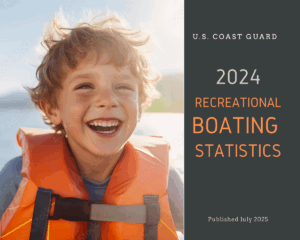By Jeff Moag, Water Sports Foundation
Boating under the influence of alcohol or drugs is the number-one cause of boating deaths and injuries in the United States and accounts for hundreds of millions of dollars in damages every year, according to U.S. Coast Guard recreational boating reports.
Whether you’re a journalist who regularly covers boating or a general-assignment reporter covering breaking news about a boating accident, there are a few things you should know about boating under the influence, or BUI.
BUI INCIDENCE IN THE UNITED STATES
It is important to understand how prevalent BUI is in the United States. Take it from Corporal Stacey Mosher, a 25-year veteran patrol officer on Missouri’s Lake of the Ozarks.
“I can’t remember a serious injury two-boat collision or a fatal two-boat collision where alcohol wasn’t involved,” the Missouri State Trooper said.

Let that sink in.
Mosher has been patrolling one of America’s busiest recreational waterways for a quarter-century, and during that time she can’t recall one major on-water collision that didn’t involve alcohol.
The statistics on BUI are eye-opening, but before we unpack them, it’s well to remember that every alcohol-related boating accident has profound repercussions for those involved.
Mosher’s colleague Jacob Hardy vividly recalls one of his first BUI calls as a rookie trooper. A man had driven his boat full-throttle into a wooded shoreline.
“It was just complete carnage. Subjects were lying on the ground pinned between the bow and the trees,” Hardy said, adding that the man’s decision to get behind the wheel of his powerboat after a day of drinking at a lakeside restaurant had permanently altered the lives of several people.
Mosher and Hardy shared their anecdotes in an award-winning Water Sports Foundation video about impaired boating.
Many journalists have covered drunk driving accidents and their aftermath, and the first instinct may be to cover BUI the same way. However, while there are many similarities between driving automobiles and boating under the influence, there are significant differences in the law, the frequency and consequences of alcohol-related accidents, and even the way that alcohol affects drivers and boaters in their respective environments.
The Effect of Alcohol is Accentuated on the Water
The physiological effects of alcohol are compounded by conditions boaters typically encounter on the water, which means that drink-for-drink, a boat operator may become impaired more quickly than an automobile driver.
The motion, vibration, engine noise, sun, wind and spray boaters experience in the marine environment can accelerate impairment. These stressors cause fatigue that makes a boat operator’s coordination, judgment and reaction time decline even faster when using alcohol.

“People don’t realize the environment out here on the water in a boat is so different than the environment sitting at home in your La-Z-Boy,” Hardy said. “The waves, the heat and the sun, the vibrations from the boat, the noise—all these factors take a toll on your body and play into how your body responds to the alcohol that you’re consuming.”
Alcohol affects judgment, vision, balance and coordination. These impairments can be even more dangerous on the water than on land, because boaters are often less experienced and less confident on the water than they are on the highway. While many people drive every day, the average American boater logs only 110 hours on the water per year.
As a result of these factors, the Coast Guard estimates a boat operator with a blood alcohol concentration above .10 percent is more than 10 times as likely to die in a boating accident than a sober operator. Alcohol also puts boating passengers at greatly increased risk for injury and death—especially if they too are using alcohol.
Impaired Passengers Increase Risk For Everyone
Another unique aspect of BUI is that impaired passengers are at greater risk, both to themselves and others in their own boat and surrounding waters. While falling out of a moving car is rare under any circumstances, boaters under the influence of alcohol or drugs are at risk of going overboard. Impaired passengers are also less attentive, notes Paul Barnard, the recreational boating safety program manager for the Coast Guard’s sprawling Heartland District.
“The leading primary contributing factor in boating accidents is alcohol, and the next biggest is what we call navigation rules—factors that have to do with awareness and alertness,” Barnard says. “One of the things that we preach in boating safety education is that everybody on the boat is a lookout. But if those passengers are impaired they can’t do their part.”
Barnard recalls an incident from his days as a rescue boat coxswain that puts these combined hazards in stark relief.
“We got a call from a boater whose speech was slurred over the VHF radio and he reported that he was missing two of his passengers and had last seen them 20 minutes prior,” he says. The passengers, both inebriated, had decided it was a good idea to roll off the boat into the water, Baywatch style. Only they didn’t tell the boat’s operator or the four other passengers—none of whom noticed they were missing.
“We were fortunate to have recovered them,” Barnard recalls. “Neither of them was wearing a life jacket and both were on the brink of drowning when we finally found them.”
BUI and the Law
Boating under the influence of alcohol and drugs is illegal in every state. Penalties for BUI can include large fines, revocation of operator privileges and jail time.The Coast Guard also enforces a federal law prohibiting BUI. The law pertains to all boats, from kayaks to cargo carriers, and includes foreign vessels that operate in U.S. waters as well as U.S. vessels on the high seas.
A few pertinent facts:
- In most states, the legal blood-alcohol limit is the same as for driving under the influence. The limit is .08 percent in most jurisdictions, though there are some exceptions. The U.S. Coast Guard maintains a useful list of each state’s limits.
- In Florida, fines and penalties are increased for BUI if a person under 18 is a passenger. Florida is also one of 21 states with more stringent BUI limits for minors, ranging from zero-tolerance to .02 percent.
- In Californiathe blood alcohol limit for individuals operating a commercial vessel is .04 percent, which is half the state’s legal limit for non-commercial BUI and driving under the influence (DUI).
- Thirteen states and territories count a BUI conviction as a DUI when considering whether to suspend or revoke the offender’s driver license.
- For details on how your state handles BUI and driving privileges, see this web page maintained by the U.S. Coast Guard.
Key Statistics About BUI
Unless otherwise noted, the findings cited below are taken directly from the U.S. Coast Guard’s annual Recreational Boating Statistics (RBS) report, a massive trove of information on boating accidents and their causes in the United States. New reports are issued each June with data collected the previous year. Download the latest RBS report here.
- Alcohol use remains the leading cause of boating-related deaths in the United States.
- Alcohol was the primary contributing factor in 115 U.S. boating fatalities in 2020.
- Alcohol was the primary contributing factor in 34 percent of U.S. fatal boating accidents in 2020 where the accident cause involved vessel operation, according to U.S. Coast Guard accident data.
- Alcohol was the primary contributing factor in more than 18 percent of U.S. boating deaths in 2020 from all causes, including those attributed to equipment failure and weather.
- By comparison, alcohol-impaired driving fatalities accounted for 28 percent of all U.S. traffic deaths in 2019, according to the National Highway Transportation Safety Administration.
- Accidents involving drinking are far more likely to be serious than those caused by other factors. More than 40 percent of boating accidents in which alcohol was the primary cause resulted in fatalities, compared to just over 12 percent of accidents caused by all other factors.
NOTE: If you want to peruse the full 83-page report, I recommend a quick review of the detailed table of contents to help with navigation. In addition, the “Command-F” trick will expedite your search. For example, if you’re looking for statistics about the number of boating accidents in your state, search by state name or postal abbreviation to toggle quickly through a host of statistics. This can be a powerful tool for local news coverage, allowing you to quickly gather authoritative statistics about BUI and other boating accident data in your area.
Saving Lives
In 25 years patrolling Lake of the Ozarks, Corporal Mosher has made hundreds of BUI arrests, resulting in hundreds of thousands of dollars in fines and more than a little jail time.
While law enforcement is a key component of her job, she said her most important role is keeping people safe. Her colleague Brian Geier, an 18-year veteran water patrolman, said he’s made arrests in which he was certain the offenders never would have made it to their destination.
“In all the arrests we make people are over the legal limit, but there’s always a handful that you’re pretty sure you probably save their life or the life of somebody else,” Geier said, adding that he may let a boater off with a warning for lesser transgressions, but never for BUI. “If you’re intoxicated or impaired you’re going to get arrested, and probably go to jail,” he said.
Supplemental BUI Information
Please find details and information below regarding BUI including national boating safety and education programs designed to address and reduce the incidence of BUI.
BUI and Life Jacket laws by state. USCG Chart: https://www.boatingsafety.com/blogpost/1828549/346202/Boating-Under-the-Influence–Life-Jacket-Age-Reference-State-by-State
Boat-Ed.com searchable database of state BUI laws: https://www.boat-ed.com/bui-laws/
Operation Dry Water is a BUI awareness and prevention campaign of the National Association of Boating Law Administrators (NASBLA). https://community.nasbla.org/operationdrywater/home
The Sea Tow Foundation’s Sober Skipper program encourages boaters to designate a non-drinking operator.
Four things you need to know about boating under the influence.
States With the Worst Drunk Driving Problems in 2021, via arrestrecords.com
The U.S. Coast Guard Recreational Boating Statistics reports are archived here: https://uscgboating.org/library/accident-statistics/Recreational-Boating-Statistics-2019.pdf

###
ADDITIONAL MEDIA SUPPORT
The communications team at the Water Sports Foundation has designed the National Boating Safety Media Center to provide relevant and accurate content, imagery, experts and resources to assist journalists in story development. If further assistance is needed, please feel free to Contact Us for additional support. https://www.watersportsfoundation.com/about/contact-us/



